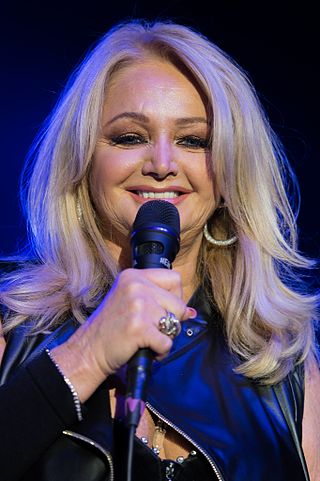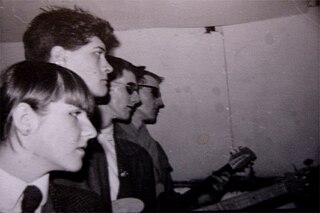Related Research Articles

Gaynor Sullivan, known professionally as Bonnie Tyler, is a Welsh singer. Known for her distinctive husky voice, Tyler came to prominence with the release of her 1977 album The World Starts Tonight and its singles "Lost in France" and "More Than a Lover". Her 1977 single "It's a Heartache" reached number four on the UK Singles Chart, and number three on the US Billboard Hot 100.

Dame Shirley Veronica Bassey is a Welsh singer. Known for her career longevity, powerful voice and recording the theme songs to three James Bond films, the only artist to perform more than one, Bassey is one of the most popular vocalists in Britain.

Catatonia were an alternative rock band from Wales who gained popularity in the mid-to-late 1990s. The band formed in 1992 after Mark Roberts met Cerys Matthews and Kirsty Kennedy. The first major lineup featured Dafydd Ieuan of Super Furry Animals on drums, Paul Jones on bass, and Clancy Pegg on keyboards. With this line-up the band recorded two EPs, For Tinkerbell and Hooked.

Super Furry Animals are a Welsh rock band formed in Cardiff in 1993. For the duration of their professional career, the band consisted of Gruff Rhys, Huw Bunford, Guto Pryce, Cian Ciaran, and Dafydd Ieuan. An earlier incarnation of the band featured actor Rhys Ifans on lead vocals. The band are considered to be part of the renaissance of Welsh culture which emerged in the 1990s: other Welsh bands of the time include the Manic Street Preachers, Stereophonics, Catatonia and Gorky's Zygotic Mynci.

Stereophonics are a Welsh rock band formed in 1992 in the village of Cwmaman in the Cynon Valley. The band consists of Kelly Jones, Richard Jones, Adam Zindani, Jamie Morrison and touring member Tony Kirkham (keyboards). The group previously included Stuart Cable (1992–2003) and then Javier Weyler (2004–2012) on drums. Stereophonics have released twelve studio albums, including eight UK number one albums. A successful compilation album, Decade in the Sun, was released in November 2008 and charted at number two on the UK Albums chart.

Spandau Ballet were an English new wave band formed in Islington, London, in 1979. Inspired by the capital's post-punk underground dance scene, they emerged at the start of the 1980s as the house band for the Blitz Kids, playing "European Dance Music" as "The Applause" for this new club culture's audience. They became one of the most successful groups of the New Romantic era of British pop and were part of the Second British Invasion of the Billboard Top 40 in the 1980s, selling 25 million albums and having 23 hit singles worldwide. The band have had eight UK top 10 albums, including three greatest hits compilations and an album of re-recorded material. Their musical influences ranged from punk rock and soul music to the American crooners Frank Sinatra and Tony Bennett.

Young Marble Giants were a Welsh post-punk band formed in Cardiff, Wales, in 1978. Their music was based around the vocals of Alison Statton along with the minimalist instrumentation of brothers Philip and Stuart Moxham. Their early sound was a sharp contrast with the more aggressive punk rock that dominated the underground at the time. Young Marble Giants released just one studio album, Colossal Youth, in 1980. They also released two EPs and recorded a John Peel session.

David William Edmunds is a Welsh retired singer, songwriter, guitarist and record producer. Although he is mainly associated with pub rock and new wave, having many hits in the 1970s and early 1980s, his natural leaning has always been towards 1950s-style rock and roll and rockabilly.

Mary Hopkin, credited on some recordings as Mary Visconti from her marriage to Tony Visconti, is a Welsh singer best known for her 1968 UK number 1 single "Those Were the Days". She was one of the first artists to be signed to the Beatles' Apple label.

10cc are a British rock band formed in Stockport in 1972. The group initially consisted of four musicians — Graham Gouldman, Eric Stewart, Kevin Godley and Lol Creme — who had written and recorded together since 1968. All four members contributed to songwriting, working together in various permutations. Godley and Creme’s songwriting has been described as being inspired by art and cinema. Every member of 10cc was a multi-instrumentalist, singer, writer and producer. Most of the band's records were recorded at their own Strawberry Studios (North) in Stockport and Strawberry Studios (South) in Dorking, with most of those engineered by Stewart.

Osibisa is a British-Ghanaian-Caribbean Afro-rock band founded in London in the late 1960s by four expatriate West African and three London based Caribbean musicians.

Scritti Politti are a UK band formed in 1977 in Leeds, England by Welsh singer-songwriter Green Gartside, who is the sole remaining member of the original band.

Bob Marley and the Wailers were a Jamaican ska, rocksteady and reggae band. The founding members, in 1963, were Bob Marley, Peter Tosh, and Bunny Wailer.
Amen Corner were a Welsh rock group formed in Cardiff, Wales. They are best known for their hits "Bend Me, Shape Me" (1968), "High in the Sky" (1968) and the chart-topper "(If Paradise Is) Half as Nice" (1969).

Michael Barratt, known professionally as Shakin' Stevens, is a Welsh singer and songwriter. He was the UK's biggest-selling singles artist of the 1980s.

The Alarm are a Welsh rock band that formed in Rhyl, Wales in 1981. Initially formed as a punk band, the Toilets in 1977, under lead vocalist Mike Peters, the band soon embraced arena rock and included marked influences from Welsh language and culture. By opening for acts such as U2 and Bob Dylan, they became a popular new wave pop band of the 1980s.

"Get It On" is a song by the English rock band T. Rex, featured on their 1971 album Electric Warrior. Written by frontman Marc Bolan, "Get It On" was the second chart-topper for T. Rex on the UK Singles Chart. In the United States, it was retitled "Bang a Gong (Get It On)" to avoid confusion with a song of the same name by the group Chase.

Lone Star was a Welsh rock and heavy metal music band formed in Cardiff in 1975. They released two albums on CBS Records before splitting up in 1978.

"Delilah" is a song recorded by Welsh singer Tom Jones in December 1967. The lyrics were written by Barry Mason, and the music by Les Reed, who also contributed the title and theme of the song. It earned Reed and Mason the 1968 Ivor Novello award for Best Song Musically and Lyrically.

A Crazy Steal is a UK studio album by English rock/pop group the Hollies. It includes their version of Emmylou Harris' "Boulder to Birmingham", which had been released two years prior, reaching number 10 in the charts in New Zealand. Three other songs from this album were released in 1977, and 1978 as singles, yet failed to chart anywhere.
References
- ↑ "Tony Etoria And The 'X' Factor". Blues & Soul (July). 1977.
- ↑ "Tony Etoria - Full Official Chart History". Official Charts Company. Retrieved 19 January 2016.
- 1 2 Ali Stokes (11 February 2001). "'I worked with Michael Jackson - when he had a face' Whatever happened to. . . ? Tony Etoria". South Wales Echo. Retrieved 6 June 2020.
- ↑ "From the music capitals of the world". Billboard. Vol. 90, no. 27. 8 July 1978. p. 63.
- ↑ Charles Aniagolu (2004). Osibisa: Living in the State of Happy Vibes and Criss Cross Rhythms. Trafford. p. 186. ISBN 978-1-4120-2106-7.
- ↑ Studio Sound and Broadcast Engineering. Link House Publications. 1991. p. 10.
- ↑ Gérard Lautrey (July 2012). Dans L'ombre des Shadows (in French). Lulu.com. p. 76. ISBN 978-1-4716-1124-7.
- ↑ Rhys Mwyn (10 August 2012). Cam O'r Tywyllwch (in Welsh). Y Lolfa. p. 134. ISBN 978-1-84771-582-1.
- ↑ Karen Price (16 February 2009). "New play inspired by troubled literary giants". WalesOnline. Retrieved 6 June 2020.